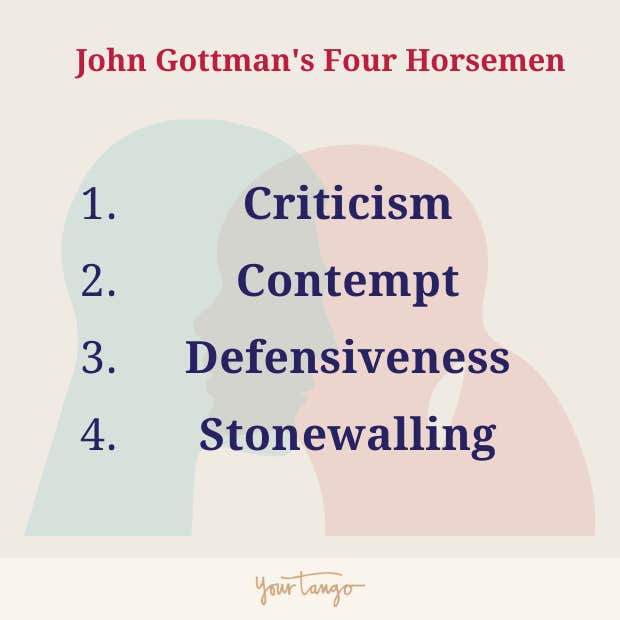Why Gottman's 'Four Horsemen' Destroy Relationships — And How To Protect Yours
The Four Horsemen don't have to mean a relationship apocalypse if you know how to tame them.
 Teona Chernikova / Shutterstock
Teona Chernikova / Shutterstock All couples face relationship problems, and marriage counselor Dr. John Gottman's decades of research[fn]Marriage and Couples - Research | The Gottman Institute. The Gottman Institute. Accessed January 3, 2023. https://www.gottman.com/about/research/couples/[/fn] have earned him worldwide recognition as a leading expert on how couples can deal with their most difficult issues most effectively.
Notably, research conducted by the Gottman Institute, headed by Gottman himself, found that, on average, 69 percent of the problems in any relationship are unsolvable.[fn]Managing vs. Resolving Conflict in Relationships: The Blueprints for Success. The Gottman Institute. Accessed January 3, 2023. https://www.gottman.com/blog/managing-vs-resolving-conflict-relationshi…]
These unsolvable issues are caused by each partner's personality traits or other issues that can never be eliminated, and therefore need to be managed rather than solved.
Looking at the problems that most commonly predict divorce, Dr. Gottman dubbed them the Four Horsemen.
What are John Gottman's Four Horsemen?
Gottman’s concept of the Four Horsemen is a metaphor for the Four Horsemen of the Apocalypse: four figures who appear on horseback in the Book of Revelation,[fn]The Editors of Encyclopaedia Britannica. Revelation to John | Summary & Facts. Encyclopedia Britannica. July 20, 1998. Accessed January 3, 2023. https://www.britannica.com/topic/Revelation-to-John[/fn] representing conquest, war, famine, and death, and "[bringing] forth the cataclysm of the apocalypse."
According to Dr. Gottman, the Four Horsemen signaling "end times" in relationships are criticism, contempt, defensiveness and stonewalling.
But don't fret, the Four Horsemen can be stopped!
If you take action once you identify the Four Horsemen within your relationship, they can be managed before too much damage is done.
While it's understandable that couples who want to solve their problems and move on aren't usually thrilled to find out that the majority of their problems aren't solvable.
I find it calming to look at it this way: if you can't fix everything, it also means you don't have to.
Knowing more about Gottman's Four Horsemen and how to deal with them will help you manage these common issues so your relationship can thrive.
John Gottman's Four Horsemen and how to deal with each in relationships
1. Criticism
It's important for couples to understand the difference between criticism and complaints.
Voicing a complaint or offering feedback is a way of addressing specific issues with the intention of improving your relationship, whereas criticizing your partner is attacking them for who they are.
How to deal with criticism in relationships:
Instead of making blanket hurtful statements about your partner, pinpoint the specific behavior or issue you currently have a problem with.
Additionally, using aggressive "you" statements instead of softer "I feel" statements can be easily perceived as being critical, even if that wasn't your intention.
Reframing your statements to address the specific problem will help you feel heard while also not putting your partner on the defensive. They help you articulate your emotions for your own personal frame of reference, while giving your partner a better understanding of your emotions. This can help the conversation be more constructive overall.[fn]Klein SR, Renshaw KD, Curby TW. Emotion regulation and perceptions of hostile and constructive criticism in romantic relationships. Behavior Therapy. 2016;47(2):143-154. doi:10.1016/j.beth.2015.10.007[/fn]
Examples of things to say to minimize criticism:
Instead of "You're so inconsiderate. Why did you bring that up?" try saying something like, "When you said that earlier, I felt hurt because I wasn't expecting to have that conversation now. Could we discuss it tonight when we've both had time to give it some thought?"
2. Contempt
Contempt takes criticism even further.
When you treat your partner with contempt, you're not just criticizing them, you are attacking from a place of moral superiority in a way that makes your partner feel disrespected, despised, and worthless.
Contempt happens when you go on the attack in order to defend your own position, and typically results from allowing frustrations and resentments to stew unaddressed for too long. Once your partner perceives contempt on your end, that alone can cause them to feel less satisfaction and commitment in the relationship.[fn]Schriber RA, Chung JM, Sorensen KS, Robins RW. Dispositional contempt: a first look at the contemptuous person. Journal of Personality and Social Psychology. 2017;113(2):280-309. doi:10.1037/pspp0000101[/fn]
Gottman's research shows that contempt is the most corrosive of the Four Horsemen and the single biggest predictor of divorce. Contempt has also been shown to weaken your immune system.[fn]Hysi, Greta. (2015). Conflict Resolution Styles And Health Outcomes In Married Couples: A Systematic Literature Review. Research and Education “Challenges towards the future" ICRAE 2015. 2.[/fn]
As Dr. Gottman says, “Contempt is sulfuric acid for love."[fn]The Trouble with Contempt. The Gottman Institute. Accessed January 3, 2023. https://www.gottman.com/blog/self-care-contempt/[/fn]
This is because it conveys disgust and can only be destructive.
How to deal with contempt in relationships:
The antidote to contempt is building a culture of appreciation and respect in your relationship. In a relationship, both partners need to be on equal ground. If you and your partner aren't approaching each other as equals, you'll start to resent one another.
To stop holding contempt for your partner, you must learn to accept one another as moral equals and express appreciation for one another on a regular basis.
Examples of things to say to minimize contempt:
"I'm thankful to have you in my life."
"I really admire your drive and sense of humor."
"I admire your level of dedication."

3. Defensiveness
Defensiveness is often a response to the first two horsemen, criticism and contempt. You feel your partner attacked you, so naturally, you want to defend yourself and may reverse blame onto them in order to feel better about yourself.
This kind of negative coping mechanism is also known as righteous indignation or innocent victimhood, which is an attempt to ward off a perceived attack. It's one of the many negative communication styles that hurt relationships.
In other words, when you feel like your partner is coming at you, you become defensive and respond in kind — and you feel justified in doing so because of how they approached the topic to begin with.
How to deal with defensiveness in relationships:
It's critical that you and your partner stop yourselves from reacting defensively on impulse and accept responsibility for your own behaviors. Blaming your partner won't get you anywhere.
When you hear yourself being defensive, pause, acknowledge your defensive behavior, and ask if you can start again.
Examples of things to say to minimize defensiveness:
"I really blew that one. I'm sorry."
"I can see my part in this and I'm sorry for it. How can I do better next time?"
"That was my bad. May I try explaining my position again, this time being more respectful of you?"
4. Stonewalling
Stonewalling, also known as the silent treatment, is when someone refuses, avoids, or withdraws from engaging in communication or problem-solving with their partner. Like defensiveness, this may happen in response to contempt.
In relationship conflicts, this is the equivalent of the flight part of the fight or flight response. People may stonewall their partner when they feel like they just can't take it anymore, but stonewalling shuts out any chance of reconciliation and prevents healing.
It is important to note that stonewalling can also be a tactic of emotional abuse. In such cases, it is typically used as a negative coping mechanism by people with an avoidant attachment style, serving to both "protect" the stonewaller and punish the partner being stonewalled, leaving the person you love feeling emotionally isolated.
This can also lead to them feeling attacked and make them become emotionally overwhelmed. Multiple studies have found evidence[fn]Li PF, Johnson LN. Couples’ depression and relationship satisfaction: examining the moderating effects of demand/withdraw communication patterns. Journal of Family Therapy. 2016;40:S63—S85. doi:10.1111/1467-6427.12124[/fn] of the link between stonewalling and depression.[fn]Papp LM, Kouros CD, Cummings EM. Demand-withdraw patterns in marital conflict in the home. Personal Relationships. 2009;16(2):285-300. doi:10.1111/j.1475-6811.2009.01223.x[/fn]
How to deal with stonewalling in relationships:
For the partner with a tendency to stonewall, learning to practice physiological self-soothing can be a huge help. Stop yourself, ask your partner for a break, and take 20 minutes in a different room to listen to relaxing music while focusing on your breath.
You can also try going for a walk, doing yoga, watching something funny, or reading an interesting book. Whatever you choose, do it where you won't see or think about your partner until you've calmed down.
And for the partner of the person doing this in order to prevent themselves from stonewalling, allow them to take this time, knowing they are doing it with both of your best interests in mind.
Examples of things to say to minimize stonewalling:
"I don't want to shut you out, but I do need to take a break in order to calm myself and collect my thoughts. Can we take a short break and pick this up again in about 20 minutes?"
"I'm feeling anxious and need to pause. I'm going to step away for a short time so I can calm down, and I promise we'll be able to finish this after.
Gottman's Four Horsemen are rarely seen in isolation in any given relationship or marriage.
These relationship issues are a family of sorts — and they can destroy an otherwise healthy relationship if you don't know how to deal with them as they arise.
With time and practice, using the techniques explained above to deal with the Four Horsemen of criticism, contempt, defensiveness, and stonewalling will feel like a natural way to communicate, and you'll enjoy one another's company again.
Couples counseling, along with relationships or parenting therapy, can also help resolve your conflicts, especially if you don't feel comfortable doing the work alone.
Learn to ride the waves in your relationship. The more you practice, the easier it will get.
Lianne Avila is a licensed marriage and family therapist with a practice in San Mateo, CA, and the founder of Lessons for Love.
